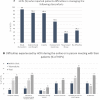Eating disorders during COVID-19 pandemic: the experience of Italian healthcare providers
- PMID: 33560511
- PMCID: PMC7871942
- DOI: 10.1007/s40519-021-01116-5
Eating disorders during COVID-19 pandemic: the experience of Italian healthcare providers
Abstract
Purpose: Due to COVID-19 pandemic, the Italian population lived in quarantine from March to May 2020 (lockdown phase I). Restrictions impacted individuals' psychological health, especially in those with eating disorders (ED). Healthcare providers (HCPs) treating ED provided assistance by telemedicine and/or in walk-in clinics. We hypothesize that social restrictions represented a great stressor for ED patients and HCPs, negatively impacted their therapeutic alliance, and affected the frequency of dysfunctional behaviors.
Methods: This cross-sectional study consisted of an online survey investigating the experience of HCPs involved in ED treatment, with a specific focus on difficulties concerning the therapeutic efficacy. Questionnaire (n. 18 questions) was formulated ad hoc by our research team and sent by e-mail to Italian HCPs registered on online platforms. HCPs included ED experts specialized in psychology, nutrition or medicine. Data were collected during lockdown phase I and referred to patients with Anorexia Nervosa-(AN), Bulimia Nervosa (BN)-and Binge-Eating Disorder-(BED).
Results: One-hundred questionnaires were collected; 84 and 76 were included in our qualitative and quantitative analyses, respectively. Thirty-six% of HCPs felt their therapeutic intervention was unsuccessful, 37% complained compromised therapeutic alliance. Changes in frequency of compensatory behaviors (increased in 41% AN and 49,5% BN; reduced in 14,6% AN and 21,8% BN) and binge-eating episodes (increased in 53,3% BN and 30,5% BED; reduced in 30,7% BN and 24,7% BED) were experienced and ascribed to augmented patient's anxiety. Disorders switches and variation in dysfunctional conducts frequency were both significantly related to ED category (p < 0.05 for all). Concentration techniques were recognized as useful to offset such negative outcomes.
Conclusion: According to HCPs, social restrictions affected the frequency of dysfunctional behaviors in ED patients and the efficacy of their therapeutic intervention. Further long-term studies are needed to confirm our data in a larger sample size.
Level iv: Novel results from a cross-sectional study.
Keywords: Anorexia nervosa; Binge-eating disorder; Bulimia nervosa; COVID-19; Eating disorders; Healthcare providers.
© 2021. The Author(s), under exclusive licence to Springer Nature Switzerland AG part of Springer Nature.
Conflict of interest statement
Authors have nothing to disclose.
Figures


References
MeSH terms
LinkOut - more resources
Full Text Sources
Other Literature Sources
Medical

